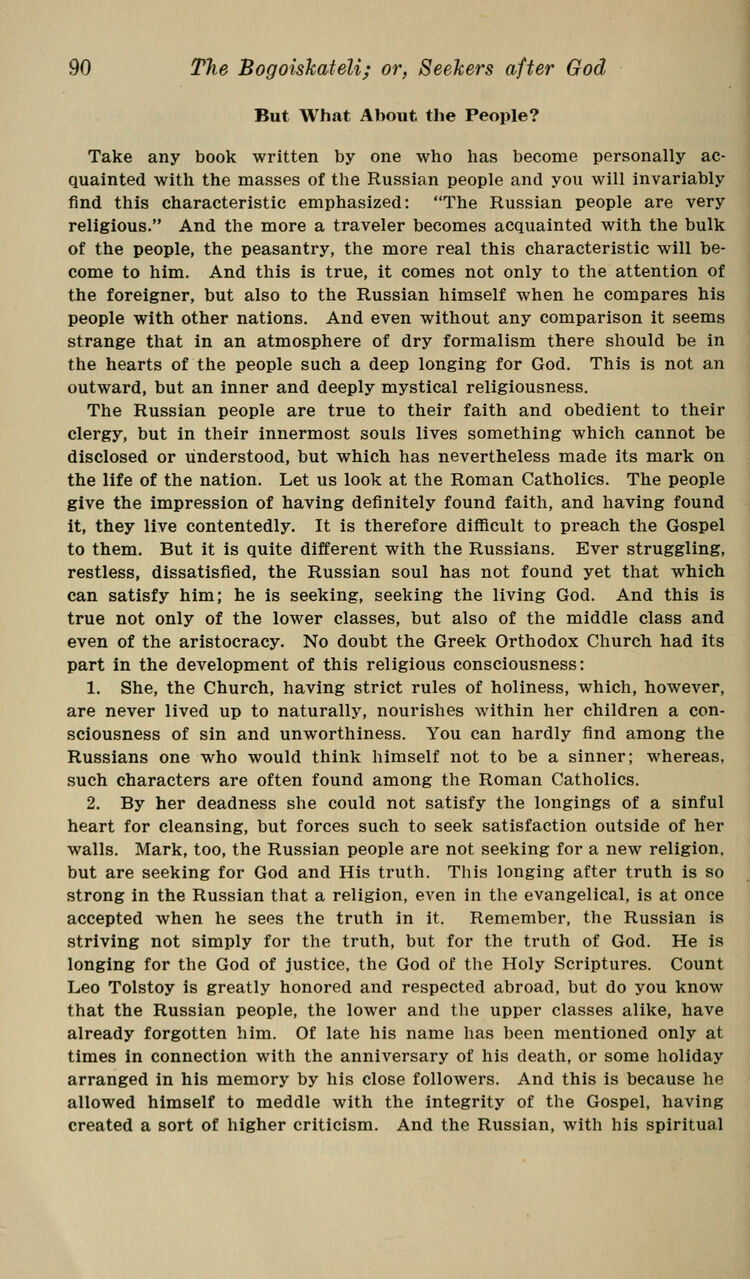
Full resolution (JPEG) - On this page / på denna sida - The Bogoiskateli: or, Seekers After God. Prof. I. V. Noprash - II - But What About the People?

<< prev. page << föreg. sida << >> nästa sida >> next page >>
Below is the raw OCR text
from the above scanned image.
Do you see an error? Proofread the page now!
Här nedan syns maskintolkade texten från faksimilbilden ovan.
Ser du något fel? Korrekturläs sidan nu!
This page has never been proofread. / Denna sida har aldrig korrekturlästs.
90 TJie Bogoiskateli; or, Seekers after God
But What About the People?
Take any book written by one who has become personally ac-
quainted with the masses of the Russian people and you will invariably
find this characteristic emphasized: "The Russian people are very
religious." And the more a traveler becomes acquainted with the bulk
of the people, the peasantry, the more real this characteristic will be-
come to him. And this is true, it comes not only to the attention of
the foreigner, but also to the Russian himself when he compares his
people with other nations. And even without any comparison it seems
strange that in an atmosphere of dry formalism there should be in
the hearts of the people such a deep longing for God. This is not an
outward, but an inner and deeply mystical religiousness.
The Russian people are true to their faith and obedient to their
clergy, but in their innermost souls lives something which cannot be
disclosed or understood, but which has nevertheless made its mark on
the life of the nation. Let us look at the Roman Catholics. The people
give the impression of having definitely found faith, and having found
it, they live contentedly. It is therefore difficult to preach the Gospel
to them. But it is quite different with the Russians. Ever struggling,
restless, dissatisfied, the Russian soul has not found yet that which
can satisfy him; he is seeking, seeking the living God. And this is
true not only of the lower classes, but also of the middle class and
even of the aristocracy. No doubt the Greek Orthodox Church had its
part in the development of this religious consciousness:
1. She, the Church, having strict rules of holiness, which, however,
are never lived up to naturally, nourishes within her children a con-
sciousness of sin and unworthiness. You can hardly find among the
Russians one who would think himself not to be a sinner; whereas,
such characters are often found among the Roman Catholics.
2. By her deadness she could not satisfy the longings of a sinful
heart for cleansing, but forces such to seek satisfaction outside of her
walls. Mark, too, the Russian people are not seeking for a new religion,
but are seeking for God and His truth. This longing after truth is so
strong in the Russian that a religion, even in the evangelical, is at once
accepted when he sees the truth in it. Remember, the Russian is
striving not simply for the truth, but for the truth of God. He is
longing for the God of justice, the God of the Holy Scriptures. Count
Leo Tolstoy is greatly honored and respected abroad, but do you know
that the Russian people, the lower and the upper classes alike, have
already forgotten him. Of late his name has been mentioned only at
times in connection with the anniversary of his death, or some holiday
arranged in his memory by his close followers. And this is because he
allowed himself to meddle with the integrity of the Gospel, having
created a sort of higher criticism. And the Russian, with his spiritual
<< prev. page << föreg. sida << >> nästa sida >> next page >>